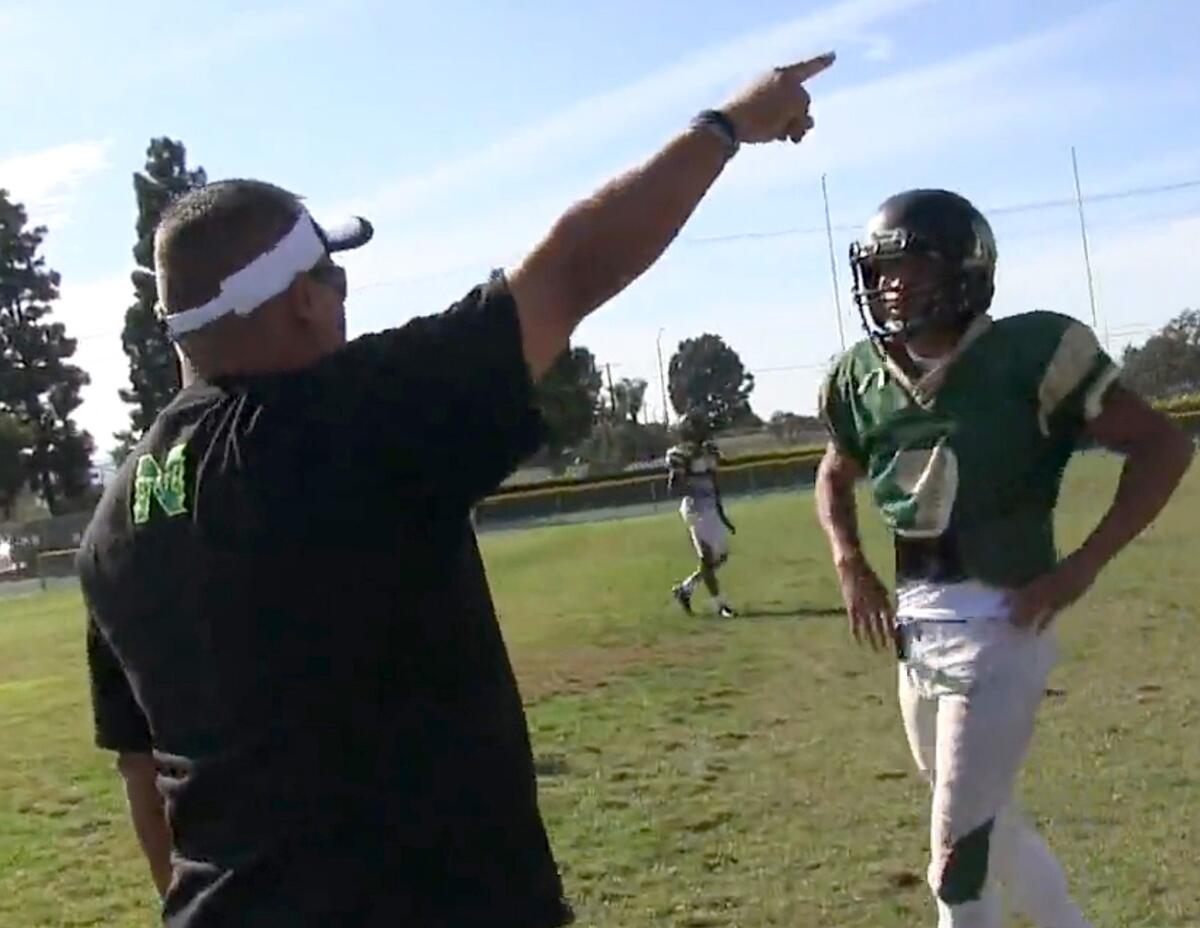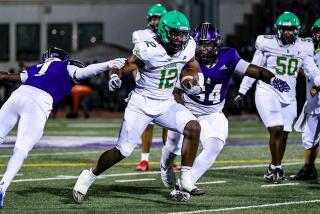Column: Legends in the fall are often made in May football practices

A group of football players from Harbor City Narbonne gathered around their coach, Manuel Douglas, who rested on one knee. He was lecturing under an overcast sky after a Saturday passing tournament game. He didn’t mention anything about patterns, coverages or dropped balls.
His brief talk was about behavior.
“You got a lot of compliments,” he said, “but I have to remind you we are representing each other and the program. No one is bigger than the program. You will not disrespect and embarrass the program. Is that understood?”
“Yes coach,” the players replied in unison.
Teaching kids how to be disciplined and not get into fights, verbally or physically, is as important as learning Xs and Os, and there’s no better test than a passing tournament. This is the time of year to find out who wants to play as part of a team or who wants to put themselves first.
High school football is changing. The month of May has become almost as busy as September for teams, with daily workouts and all-day seven-on-seven passing competitions on Saturdays.
In recent weeks, there have been tournaments at Dana Hills, San Juan Hills, Pasadena La Salle, Redondo, Pierce College and Covina Charter Oak. Loyola has hosted weekly Wednesday night competitions. Adidas is sponsoring a tournament on Monday morning at Cal Lutheran.

Narbonne Coach Manuel Douglas tells his players: “No one is bigger than the program.”
The May Madness is happening because school sports calendars have moved up, with many schools starting classes in August. Many teams now take their mandatory three-week dead period in June. Plus, colleges are holding team and satellite camps next month, adding to the summer frenzy. So there are passing competitions galore.
There’s no tackling allowed, but there’s pushing, shoving, holding and trash talking.
Kids get worn out, and suddenly they forget what they’ve been taught and start doing things that have consequences. Or they face a rival, get fired up and lose focus when things don’t go well.
It’s much better to figure out who needs guidance now than in the fall, when bad behavior that hasn’t been corrected will truly prove costly.
When I go to a passing tournament, who wins and who loses is about the last thing I’m focusing on. I’m watching to see who gets up after being pushed down; who shows leadership in the face of adversity; who shows toughness in a moment of disappointment; who shows class and respect at the end. Those are the qualities needed to be successful in the fall.
Coaches have a difficult task. Even after the lecturing, kids will be kids. One Narbonne player got struck in the head and ran off the field promising, “The next time that happens, I’m going to beat his ...”
The player didn’t do anything, thankfully. Call him a work in progress. All these tests happening on the field are certain to show up again, whether in an office setting, a classroom, traveling on a bus, on a plane, sitting in a restaurant, in a sports stadium, in a doctor’s office.
It’s about learning life skills and how to act. Coaches need to be MVP teachers. Their influence and impact can be life changing. They can’t let these teachable lessons be minimized.
A lot of teams are showing great discipline. Crenshaw’s players receive constant compliments from opposing coaches, a credit to their veteran coach, Robert Garrett.
There’s really no excuse for bad behavior, unless you care more about winning than preparing for life after high school.
eric.sondheimer@latimes.com
Twitter: @LATSondheimer
More to Read
Get our high school sports newsletter
Prep Rally is devoted to the SoCal high school sports experience, bringing you scores, stories and a behind-the-scenes look at what makes prep sports so popular.
You may occasionally receive promotional content from the Los Angeles Times.







